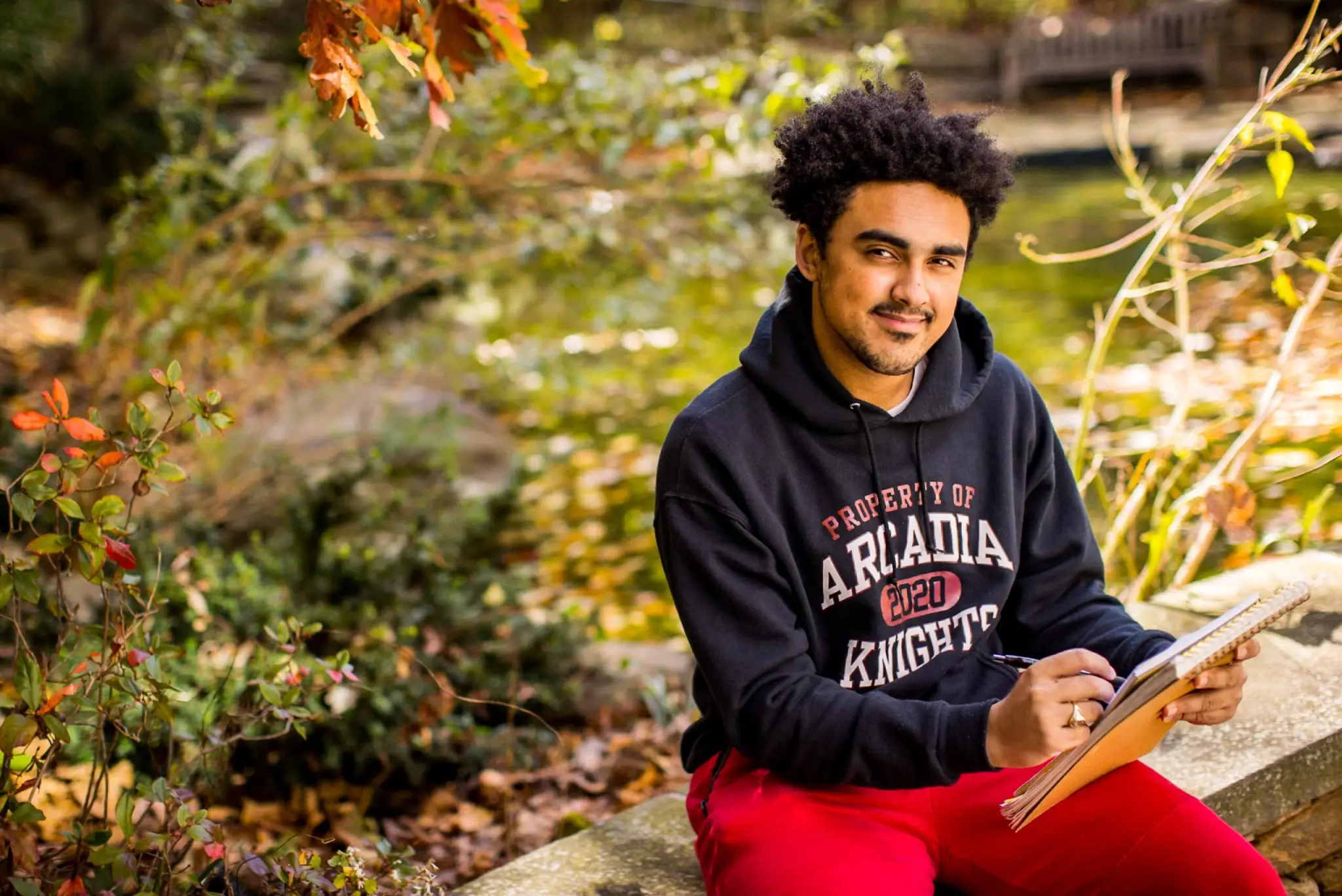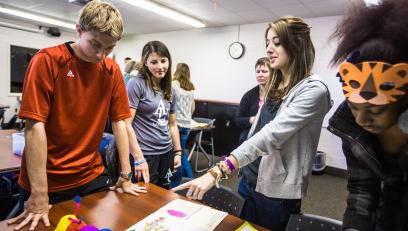
Expertise and Exploration
All the classes you take aim at expanding your mind, encouraging the development of intellectual practices and areas of inquiry that you carry across the curriculum into the workplace and life. Your education doesn’t stop with classes; it’s designed with opportunities, including faculty-mentored research, creative activity, and experiential learning, in mind.


Intellectual Practices
You will develop intellectual practices—another way of saying ‘ways of thinking and doing.’ These practices and skills cut across majors and minors, informing how you see the world and how you interact with it.

Integrative Learning Experiences
Integrative learning experiences are about joining the different aspects of your education, bringing together multiple disciplines as well as academic and experiential learning.

Areas of Inquiry
Many of our graduates say their well-rounded education expanded how they think and what they enjoy in life. That’s how a liberal arts education works, by learning multiple ways of viewing the world and finding your role in it.
Arcadia Undergraduate Curriculum Requirements
Specialize in Areas of Interest Through Your Major
You will build on the foundation you gain in the Arcadia Undergraduate Curriculum and specialize your studies in your chosen major. In fact, in every major you can take courses that contribute to the Arcadia Undergraduate Curriculum!
Frequently Asked Questions About the Arcadia Undergraduate Curriculum
Where can a student go to view progress toward graduation, how many requirements she/he has fulfilled, and what’s left to fulfill?
Students can review all this information by consulting their Academic Plan on Self-Service.
What’s the difference between a First-Year Seminar and a Learning Community?
The First-Year Seminar course forms the basis of your Learning Community. As part of the course, students also participate in experiences that connect them to the Arcadia University campus, other students, faculty and the surrounding community. Through the coursework and the experiences, we all form a “community of learners.”
What types of activities will a Learning Community do? Are the activities required, and are there any costs involved?
Learning Community activities differ depending in the subject of the First-Year Seminar, but they often involve activities around campus and around the metropolitan Philadelphia area. Individual instructors determine which Learning Community activities are required and which are optional. Typically, students are responsible for no or very minor costs relating to Learning Community activities.
Can a course or seminar fulfill multiple requirements?
Yes. University Seminars sometimes also fulfill a major requirement at the discretion of the individual department.
Courses both within and outside students’ chosen majors sometimes fulfill multiple Undergraduate Curriculum requirements simultaneously. For example, it is fairly common for courses around the University to satisfy both an Area of Inquiry and an Intellectual Practice. Similarly, the First-Year Seminars (which is a required Integrative Learning Experience) also satisfy at least one Area of Inquiry. Similarly, all University Seminars (which all satisfy one of the required additional Integrative Learning Experiences) also satisfy at least one Area of Inquiry and at least one Intellectual Practice.
Undergraduates need a total of 120 credits to graduate from Arcadia University. However, Undergraduate Curriculum requirements are defined by courses rather than credits. Most courses that fulfill Undergraduate Curriculum requirements carry 4 credits. For example, most courses that fulfill an Area of Inquiry or Intellectual Practice requirement carry 4 credits.
However, there are some exceptions:
- The Global Connections Experience is often fulfilled through a semester abroad or through a semester-long domestic exchange with a partner university. When done away from campus (either internationally or domestically), the “experience” is connected to the semester as a whole that one is away from campus, rather than connected to a specific course.
- The Global Connections Reflection is often fulfilled by completing a specific 2-credit Reflection course during one’s Global Connections Experience.
- In addition, 3-credit courses also sometimes may fulfill Undergraduate Curriculum requirements when appropriate.
Are the same University Seminars offered each semester?
No. The University Seminar program offers a rotating and evolving set of seminars each semester. Many University Seminars are often offered on a regular basis (for instance one a year or once every other year), but new University Seminars are frequently added to the offering and University Seminars offered in the past will not necessarily be offered again.
When should a student take University Seminars?
University Seminars should be taken any time after the completion of the First-Year Seminar and before beginning on one’s Senior Capstone Experience.
If a student fails or withdraws from a First-Year Seminar (FYS), are they required to take another one?
If a student does not successfully complete their First-Year Seminar, they do not take another one. Instead, they would complete three Integrative Learning (IL) requirements.
Can a student take a University Seminar (US) the same semester they take a First Year Seminar (FYS)?
A student is unable to take both a First-Year Seminar and University Seminar in the same semester. They are allowed to take a US after they have completed their FYS requirement.
How can a student fulfill the Global Connections Experience requirement?
The Global Connections experience can be fulfilled in the following different ways:
- by studying abroad in a foreign country
- by studying away at a pre-approved American university with which Arcadia has an exchange program
- by taking a special designated Glenside-based course that provides a sustained cross-cultural experience
- through a “hybrid” experience that combines short-term international experiences and semester-long local or online experiences
- through an individualized experience
What’s the difference between a Global Connections Experience and a Global Connections Reflection?
The Global Connections Reflection is typically a 2-credit online course in which the student must enroll during their Global Connections Experience. The Global Connections Reflection asks the student to document and analyze the Global Connections Experience.
What’s the difference between the Curricular Experience called “Global Connections Experience” and the Intellectual Practice called “Crossing Boundaries?”
A Global Connections Experience (whether done by studying internationally, studying away domestically, or by participating in a Glenside-based course with this designation) focuses on students immersing themselves in a sustained cross-cultural experience.
Courses designated with the Crossing Boundaries Intellectual Practice explore critical themes including those related to the interdependence, interconnectedness and inequality among and within nations, thereby preparing for their Global Connections Experience when taken before and/or following up on and further exploring those themes when taken afterward. In addition, some Preview and ID courses have added a local or online cross-cultural experience that goes across the semester and can count as a GCE. Moreover, individual students may propose adding a local experience to a Preview/ID course by submitting a proposal for a Hybrid Individualized Global Connections Experience form to the Director of Global Connections.
Is a student required to study abroad to complete the Global Connections Experience and Reflection (GE/GR) requirements?
Students can fulfill the Global Connections Experience and Reflection (GE/GR) requirements by
1) studying abroad,
2) taking a GCE-designated course in Glenside,
3) studying away at a pre-approved domestic exchange institution.
When does EN101 need to be completed?
EN101 needs to be completed by the end of a student’s first year.
Do you have to complete EN101 before taking an RW course?
Yes.
Can a Research Writing (RW) course double count as a Writing (W) course?
No, a Research Writing (RW) course will not double count as a Writing (W) requirement. Students will take four (4) Writing courses: EN101, RW, and two W courses. While the RW course does not double count, a second RW can count as one of the W courses.
Does the RW have to be completed before enrolling in the senior capstone course?
Yes.
Does the Senior Capstone Project have to be taken within the student’s major?
Yes. The Senior Capstone Project is the culminating experience within a student’s major.
If a student is a double major, do they have to do two Senior Capstone Projects?
In most cases, yes; however sometimes students may work out arrangements with the chairpersons of the two major departments in which a single, combined Capstone project integrates the academic content of both majors and therefore is permitted to count in both majors.
Where do I find a list of courses offered each semester that fulfill specific Areas of Inquiry and Intellectual Practices requirements?
A search function is available in Self-Service.
Course Development and Proposals
- Student Activities Support Application
- Area of Inquiry Designation Approval Form
- Crossing Boundaries (CB) Designation Approval Form
- First-Year Seminar Proposal
- Modern Languages (ML) Course Development
- Quantitative Reasoning (QR/QRM) Designation Approval Form
- Research Writing (RW) Designation Approval Form
- University Seminar Course Proposal
- Visual Literacy (VL) Designation Approval Form
- Writing (W) Designation Approval Form
- Global Connections Experience and Reflection (GCE/GCR) Designation Approval Form
- Combating Anti-Black Racism (CABR) Designation Approval Form
Arcadia Undergraduate Curriculum Steering Committee Members
Please contact the following members of the Steering Committee if you have any further questions about specific areas of the Curriculum.
- Jill Pederson: Chair of the Arcadia Undergraduate Curriculum, Interim Dean of the College of Arts and Sciences, Associate Professor, Art History
- Adam Hess: Director of First Year Seminars, Coordinator of Visual Literacy and Creative Expressions, Director of the Landman Library
- Tracey Levine: Director of University Seminars, Assistant Professor, English
- Jojo Lucena: Director of Global Learning, Associate Professor of Modern Languages and Cultures
- Jennifer Matisoff: Director of University Writing, Program Director Master of Arts in English, Assistant Professor, English
- James Allen: Coordinator of Quantitative Reasoning and Natural and Physical World (NPL/NP), Assistant Professor, Psychology
- Favian Guertin-Martín, Director of Combating Anti-Black Racism (CABR), Associate Professor, Criminology and Criminal Justice


